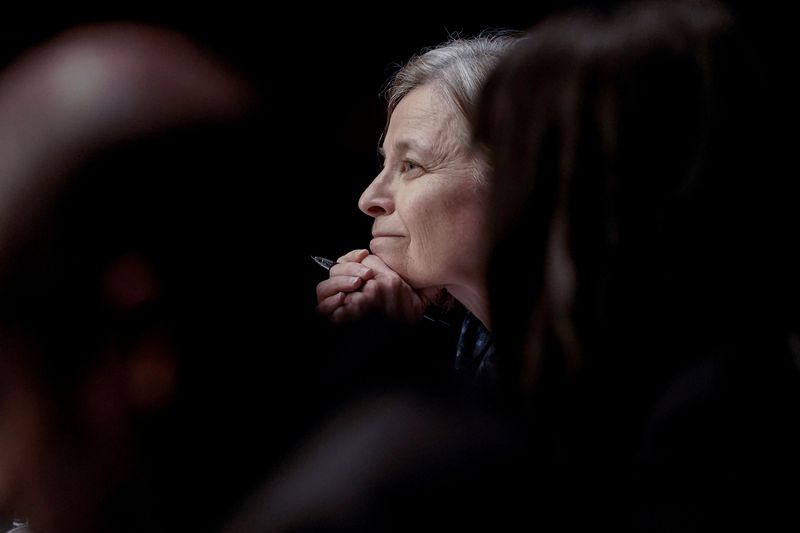
© Reuters. FILE PHOTO: Sarah Bloom Raskin, nominated to be vice chairman for supervision and a member of the Federal Reserve Board of Governors, looks on during a Senate Banking, Housing and Urban Affairs Committee confirmation hearing on Capitol Hill in Washington,
(Reuters) -Sarah Bloom Raskin on Tuesday withdrew as President Joe Biden’s nominee to become the top bank regulator at the Federal Reserve, one day after a key Democratic senator and moderate Republicans said they would not back her, leaving no path to confirmation by the full Senate.
“Despite her readiness — and despite having been confirmed by the Senate with broad, bipartisan support twice in the past — Sarah was subject to baseless attacks from industry and conservative interest groups,” Biden said in a statement.
Raskin had become the most contentious of Biden’s five nominees to the central bank’s Board of Governors, generating strong opposition from the outset from Republicans who said she would use the vice chair of supervision post to steer the Fed toward oversight policies that would penalize banks who lend to fossil fuel companies.
Raskin had been favored by progressive Democrats, such as Senator Elizabeth Warren of Massachusetts, who had pushed Biden to install someone who would pursue stiffer banking oversight after regulatory rollbacks under the previous supervision czar, Randal Quarles.
Her withdrawal clears the way for the Senate to act on the four remaining nominees, which include Jerome Powell for a second term as the central bank’s chair.
Republicans on the Senate Banking Committee, which reviews Fed appointments, had blocked progress on the nominations by refusing to attend voting sessions over their objections to Raskin.
The banking committee’s top Republican, Pat Toomey, said on Tuesday he and his colleagues were now ready to vote.
Republicans may still try to block at least a couple of Biden’s other picks, including Lael Brainard, an existing Fed governor, to be the central bank’s vice chair, and Michigan State University’s Lisa Cook, who would be the Fed Board’s first Black female member. Toomey has said he opposes both.
Powell and the last nominee, Davidson College’s Philip Jefferson, have bipartisan support.
In a 50-50 Senate that Democrats control only by virtue of Vice President Kamala Harris’ tie-breaking position, nominees need the backing of every member of Biden’s party to gain confirmation if Republicans are united in opposition, as they appeared to be in Raskin’s case.
When Senator Joe Manchin of West Virginia, a conservative Democrat from a Republican-leaning state that is among the country’s biggest coal producers, announced his opposition to Raskin on Monday – followed by “Nos” from moderate Republicans – her nomination was effectively over.
“Their point of contention was my frank public discussion of climate change and the economic costs associated with it,” Raskin said in her resignation letter. It is “not a novel or radical position,” she wrote, to add climate change to the list of risks the Fed should consider to ensure financial and economic stability.
The question for the Biden administration now is whether to pivot toward a moderate for the job or even leave the post open.
The New Yorker magazine first reported that Raskin had withdrawn her nomination.
Fusion Media or anyone involved with Fusion Media will not accept any liability for loss or damage as a result of reliance on the information including data, quotes, charts and buy/sell signals contained within this website. Please be fully informed regarding the risks and costs associated with trading the financial markets, it is one of the riskiest investment forms possible.
Stay connected with us on social media platform for instant update click here to join our Twitter, & Facebook
We are now on Telegram. Click here to join our channel (@TechiUpdate) and stay updated with the latest Technology headlines.
For all the latest Business News Click Here
For the latest news and updates, follow us on Google News.
